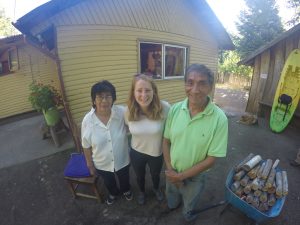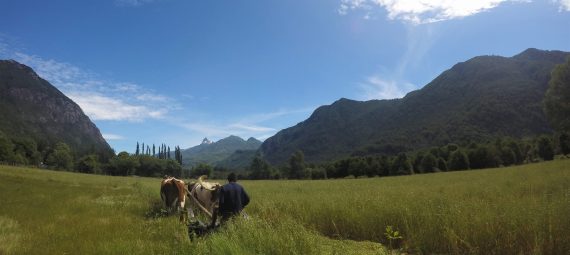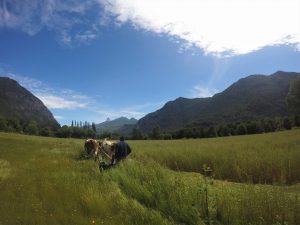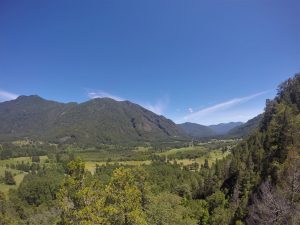After several weeks travelling around the south of Chile, I ended my time with a 3 day home stay with a Mapuche family on their farm, about an hour from Pucón, in the Arancunía Region of Chile, where the Mapuche people have lived and fought to protect their land for centuries. For my dissertation I am looking into the preservation of Mapuche culture in Santiago, so I thought this would be the best way to get a taste of how the more traditional, rural way of life compares with life in the city.
The Mapuche people are a group of Indigenous people who live in southern Chile and south-west Argentina. They are the largest group of Indigenous people in Chile, making up about 9% of the population. They have fought a long and continuous battle to win back their ancestral lands that were seized by the Chilean government during the late 1800s, and more recently to protect their lands fromlarge scale energy projects – mostly hydroelectric dams.

The family I stayed with live on a farm that has been passed down the generations. In the house lives Silverio, president of the community, and his wife Isadora, two of their sons and two grandchildren. Their other children now live in the cities of Temuco, Pucón and Santiago. Their farm was situated in the most beautiful valley, surrounded by an abundance of forests, rivers and lakes, complete with a snow-capped volcano. The family is entirely self-sufficient, producing everything they eat and use in construction, only selling a few leftovers. This made for fantastic food cooked by Isadora; piping hot fresh bread every morning, homemade jams and incredibly tasty beef; not a fertilizer in sight. We cut the hay on my first day, using the same methods used in the 1800s; two large bulls pulling one of the first reapers ever imported into Chile, from the UK. They told me some families do have some fuel-powered machinery, but on the whole traditional methods still prevail. Other activities included kayaking down the Trankura river, visiting several sacred rivers, hiking to several lookout points, vegetable picking and attending community meetings.
Both Mapuche religion and culture are based on a complex cosmology and intimate relationship to do with man’s interaction with nature and the landscape. Their name in itself means ‘people of the land’; they have developed a profound understanding of the land, flower and fauna, enabling them to forge a way of life that enables them to reap the benefits of nature in a sustainable and low-impact manner. Everything in nature has a spirit, and there exists a deep respect for what nature can provide to man; they seek to preserve and not damage this order. Without the land, there is little foundation for the existence of Mapuche culture and religion.
The Mapuche people famously and successfully defended their lands from the Incas, and then later on the Spanish until capitulation. They do however still retain a portion of their ancestral lands. But the sad reality is that what violence and weapons could not conquer,is being achieved by alleged economic progress.. Large international energy companies threaten this simple yet beautiful way of life that allows man to live in harmony with nature. A large quantity of small scale dams have been proposed in the area, mostly by foreign energy companies. One of these planned would affect one of the sacred rivers very close to the family’s farm. Blocking the flow of water would cut off the source of life that enables trees to grow, animals to live and families to farm. Furthermore, some of the proposed dams will interrupt sacred places for these people, such as those where Nguillatún – one of the most important events in the year where the community asks the spirits for an abundant harvest, social cohesion, and good health amongst other things – is performed, or rivers that have for centuries held special sacred qualities for the community. And finally, if the rivers dry up, the tourists will cease to come. The community aims to keep tourism low-key and low-impact, but tourists do come, in particular to raft and kayak on the many rivers, and thus stay with families and consume local goods. The absence of tourists would result in the disappearance of an important economic input into the community.
What really broke my heart however, was what this conflict has done to a once very tight community, who are all descendants of the same ancestors. Silverio told me how one international energy company went knocking on the doors of families in the community, offering them 500 mil pesos, or about £600, in exchange for support for the dam in the form of a formal signature. These are some of the poorest families in Chile, and thus it’s understandable that some chose to take the payment. The amount is however nothing in relation to what they stand to lose. These people lack the information and the knowledge required to make an informed decision. And the energy companies know that. Money driven and hungry for profit, they take advantage of the lack of education of these people, and in the process divide the community. Silverio told me how much it saddens him that he no longer socialises with, or even says hello to friends he had had since he was a boy. Understandably, he can neither understand nor accept their choice to support a dam that will threaten the survival of his community. To accept their decision would undermine the fight he, along with so many others, is waging to protect his home and his land.
It is not possible to put a value on this land and the role it plays in helping a traditional community to continue to live as they always have done; most don’t want compensation or money, it’s not about that. They have even been presented in the media as ‘terrorists’, faced with severe governmental oppression and police violence, yet as Silverio repeatedly told me, his community wants nothing more, but nothing less, than to have the government assure them that their lands will remain protected.
And so their fight continues. Despite there being next to no support from the government, so far they have been successful. I left this community with a heavy heart, hoping that they continue to be successful in their fight, so that their children and their grandchildren can continue to live as their parents and grandparents did. I also felt so lucky to have stayed with probably two of the nicest, most welcoming people I have ever met, who remain and stay so positive and hopeful despite all that they face. It was a remarkable few days and very humbling.
I hope very much to return one day to the same tranquil community, free of hydroelectric plants as it should rightfully be!
Beth




Hi Bethan – loved this blog. Very informative and full of emotion. What an amazing experience for you. One you will always remember. Have fun. Lynne xx